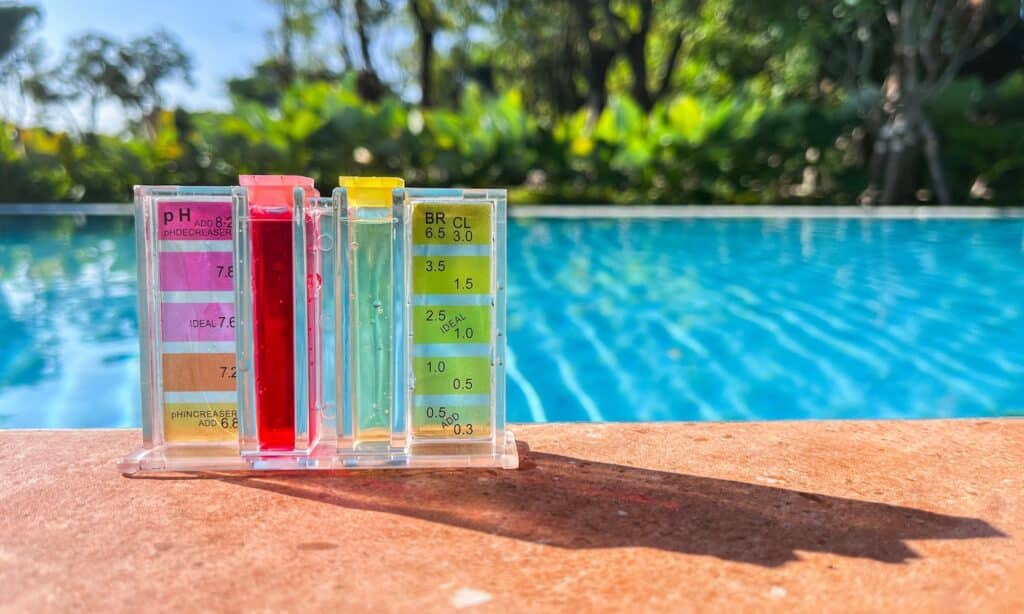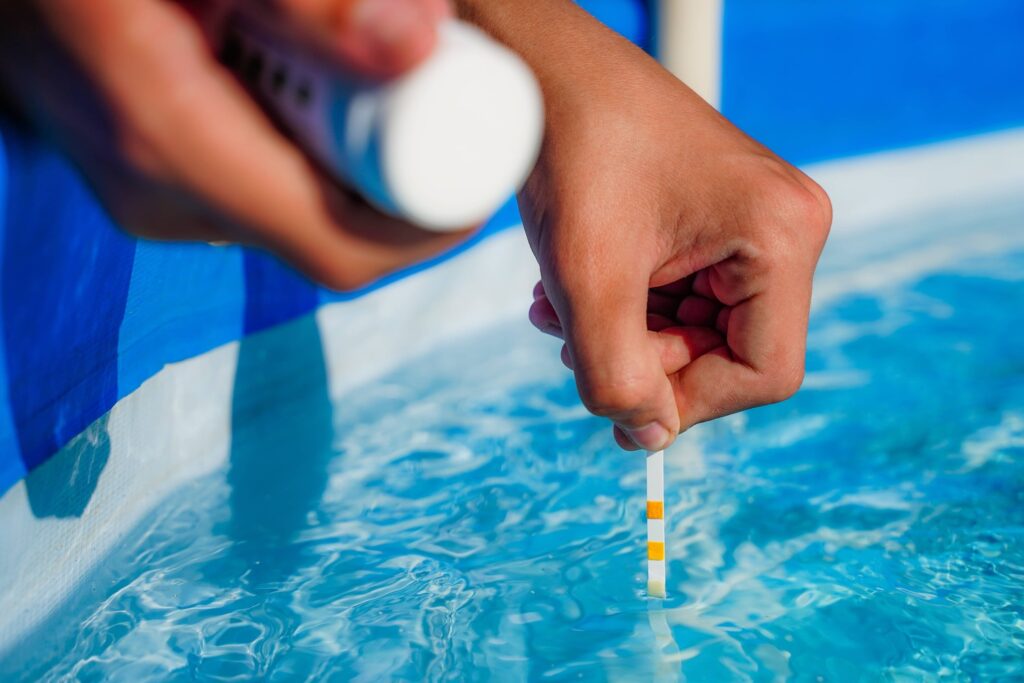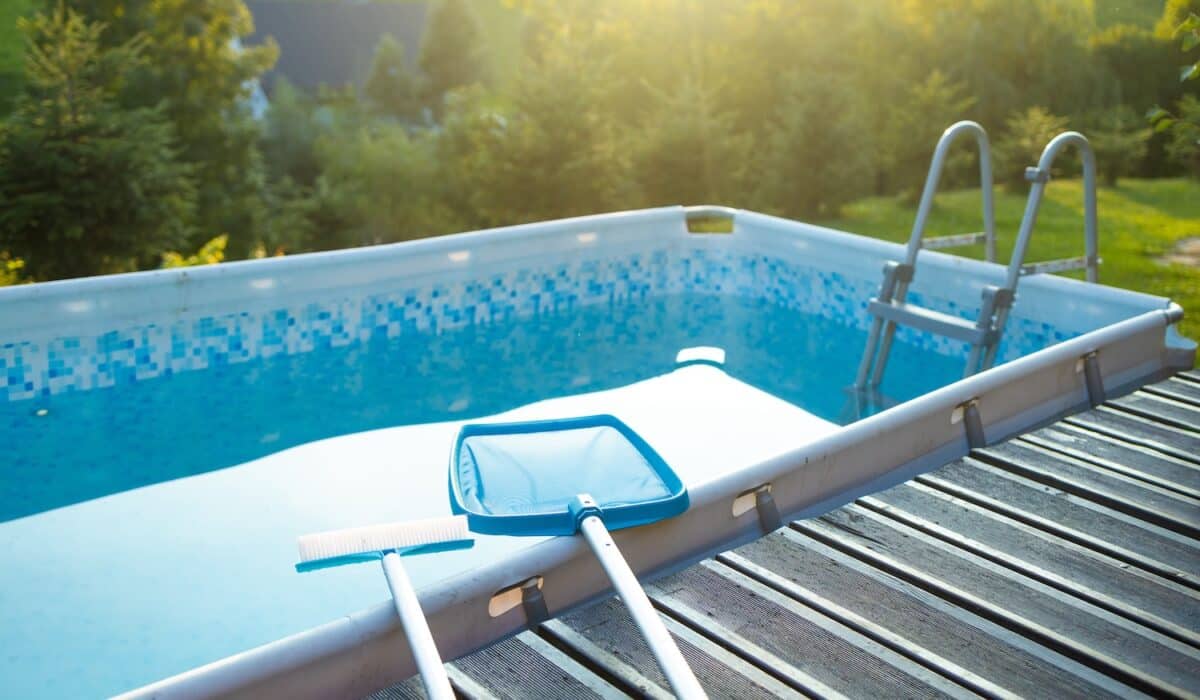Pool parties, play dates, and pool fun in the summer are just some of the things we think about with swimming pools. Maintaining proper chemical balance in your pool isn’t something you likely think about a lot, but it’s still essential for the safety and comfort of swimmers. Alkalinity is a key factor in this balance, so learning more about it, how to lower it in the pool if it is too high, and handling chemicals safely are all critical skills.
What is Alkalinity?
Alkalinity in a pool refers to the concentration of carbonates, bicarbonates, and hydroxides, and it’s vital for neutralizing acids and maintaining stable pH levels. The ideal range for total alkalinity is generally 80-120 ppm.
Increased alkalinity can be due to excessive use of alkaline products, high mineral content in the water source, environmental contaminants, or evaporation that concentrates substances in the water.

How to Lower Alkalinity in a Pool
Excessive alkalinity can lead to cloudy water, scaling on surfaces and equipment, swimmer discomfort, and reduced chlorine effectiveness. It is time to put a plan into action and lower the alkalinity in a pool. You can do this by:
1. Adding muriatic acid or sodium bisulfate in appropriate amounts.
2. Following proper dilution and distribution techniques to avoid damaging the pool surface.
3. Testing and re-adjusting over time to achieve the ideal alkalinity level.
Importance of Safety With Pool Chemicals
Proper handling of pool chemicals is crucial to prevent personal injury, ensure their effectiveness, avoid dangerous reactions, protect the environment, comply with legal regulations, prevent property damage, and safeguard community health. Handling pool chemicals with the utmost care is essential for several compelling reasons:
- Personal Safety: Many pool chemicals are corrosive and can cause severe burns, respiratory issues, or other injuries if they come into contact with skin, or eyes, or are inhaled. Using protective gear such as gloves, goggles, and masks is crucial.
- Chemical efficiency: Storing and using chemicals according to manufacturer instructions ensures that they work effectively. Improper handling can degrade the chemicals, reducing their sanitizing properties and leading to the need for additional treatments.
- Preventing Chemical Reactions: Different pool chemicals can react violently when mixed improperly, potentially causing fires, explosions, or toxic gas emissions. It’s vital to never mix chemicals unless explicitly directed and to add chemicals to water rather than water to chemicals.
- Environmental Protection: Spills or incorrect disposal of pool chemicals can harm the environment. Safe handling minimizes the risk of accidental release into ecosystems where they can damage plant life, and wildlife, and contaminate water sources.
- Legal Compliance: There are regulations and guidelines in place for the handling and storage of hazardous materials, including pool chemicals. Adhering to these laws helps avoid legal penalties and ensures community safety.
- Avoiding Property Damage: If mishandled, chemicals can stain or erode pool surfaces and equipment. Proper handling helps maintain the appearance and functionality of the pool area
- Community Health: In shared pool environments, the responsibility of safe chemical handling extends to all users. Mishandling could lead to public health incidents.
High TDS Levels and Water Quality
Alkalinity acts as a pH buffer. Large shifts in alkalinity can cause significant pH changes, which can destabilize the pool water. High Total Dissolved Solids (TDS) can reduce sanitizer efficacy, create cloudy water, cause staining and scaling, and accelerate corrosion.
Monitoring TDS levels involves regular testing and can be managed through dilution, filter maintenance, and controlled chemical use.

The Importance of Regular Water Chemistry Testing
Regular testing and adjusting of the pool’s chemical levels are fundamental for ensuring swimmer safety, maintaining water clarity, protecting equipment, achieving effective sanitization, providing a comfortable swimming experience, optimizing cost efficiency, and facilitating predictive maintenance.
Regular testing and adjustment of a pool’s chemical levels are critical practices for several reasons:
- Swimmer Safety: Ensuring that the chemical levels are within the recommended ranges minimizes the risk of skin and eye irritation, as well as other health issues that can arise from swimming in improperly balanced water.
- Water Clarity: Proper chemical balance is essential for maintaining clear and inviting pool water. Imbalances can lead to cloudy water or the growth of algae and bacteria, which compromise the aesthetic appeal and hygiene of the pool.
- Equipment Longevity: The right chemical balance prevents corrosion and scaling on pool equipment and surfaces. This extends the lifespan of the pool’s infrastructure, saving money on repairs and replacements.
- Effective Sanitization: Chlorine and other sanitizers work best within certain chemical parameters. Regular testing ensures that these chemicals can effectively eliminate harmful pathogens without being too harsh on swimmers.
- Comfortable Swimming Experience: Balanced pH and alkalinity levels contribute to a more comfortable swimming experience by preventing the water from becoming too acidic or basic. This can cause discomfort.
- Cost Efficiency: By avoiding the extremes of over-correction or neglect, regular testing and adjusting help maintain the pool with minimal waste of chemicals and resources.
- Predictive Maintenance: Consistent monitoring can help predict and prevent potential problems before they become serious, thus avoiding emergency treatments that can be costly and disruptive.
Swimming Pool Maintenance
Now that you know about lowering the alkalinity in the swimming pool, let’s look at other areas of swimming pool maintenance. One of those is swimming in a green pool. If it is a light green, then it is okay. However, if it is dark green or black then it has been without chemicals for too long and needs to be avoided. A professional will need to be called at this point to clear up the pool.
Another is how long after you shock your pool until you can swim in it. The answer is 24 hours. The reason why you had to shock it was it was low on chemicals and they need to rebalance. Your pool probably also turned green and need to give the chemicals time to work and clean it up so it is safe to swim. If you are not sure, contact a professional and use a pool testing kit to know if it is balanced.
When to Call a Professional
When in doubt about balancing chemicals or if problems persist, consult a pool maintenance professional to address potential underlying issues. Also, if you’re unsure about the chemical balancing process, or if your attempts to adjust the alkalinity and pH aren’t successful, it’s prudent to call a pool maintenance professional. Persistent imbalance may indicate an underlying issue that requires expert diagnosis and treatment.
Conclusion
Proper management of pool alkalinity and other chemical levels is critical for a healthy and enjoyable swimming environment. Commit to regular testing, cautious chemical handling, and seek expert advice when needed. Understanding and managing the alkalinity in a pool is essential for maintaining a healthy swimming environment.
Additionally, by regularly testing and carefully adjusting your pool’s chemical levels, you’ll protect the integrity of the pool, ensure the effectiveness of disinfectants, and provide an enjoyable experience for all swimmers. Always proceed with caution when handling pool chemicals and seek professional help if needed. This is a good time to reach out to Edifice Inspections in Peachtree Corners, GA to conduct a pool inspection as well as a home inspection.


1 Comment
Comments are closed.